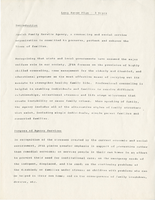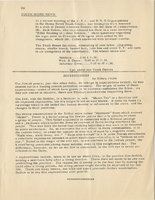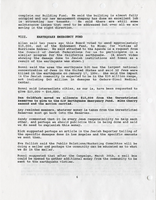Search the Special Collections and Archives Portal
Search Results
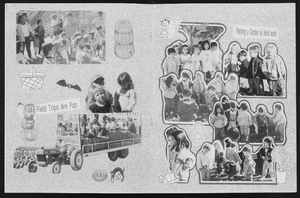
Congregation Ner Tamid Preschool Memories yearbook, 2000
Date
Archival Collection
Description
Congregation Ner Tamid (C. N. T.) preschool "memories" yearbook from 2000.
Image

Transcript of interview with Kenny Epstein by Barbara Tabach, May 1, 2015
Date
Archival Collection
Description
On a pleasant spring evening at sundown in April 2017, a Pop-Up Shabbat draws a crowd of Jews to the Jackie Gaughan Parkway at the El Cortez Hotel & Casino. Proudly, and quietly, watching from the sideline is Kenny Epstein, owner of the El Cortez. He seeks no recognition, but is enjoying the gathering for Sabbath services and the music that will fill the air. Kenny Epstein is also a classic enthusiast of Las Vegas history. The nostalgia is evident as one walks through the casino and reinforced by the stories of a man who has experienced the city’s growth since moving here in 1959 at the age of 18. The timeline of Kenny’s teen years begins with his bar mitzvah in Chicago and a story of prizefighter Rocky Marciano giving a brief toast. When he was 15, his parents, Ike and Adele Epstein, took the family to visit Las Vegas. About three years later, his father became an executive at the Stardust. Kenny’s own imprint on Las Vegas history was just beginning. In this brief interview, he mentions an illustrious list of mentors and recalls many historic moments from the history of the Las Vegas Strip. All of which led to his ownership of The El Cortez—advertised as the longest continuously operating hotel/casino.
Text
Jewish Community Center of Southern Nevada
The Jewish Community Center of Southern Nevada is a nonprofit organization that offers programs and activities that focus on Jewish culture, identity and values. It is located in Las Vegas, Nevada and is a partner of the Jewish Federation of Las Vegas.
Corporate Body
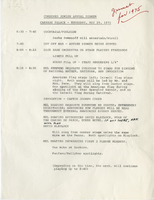
LVCJA Ball programs and planning documents, item 09
Description
The schedule for the Combined Jewish Appeal Dinner at Caesars Palace on Thursday, May 29, 1975.
Sonja Saltman oral history interview
Identifier
Abstract
Oral history interview with Sonja Saltman conducted by Barbara Tabach on August 18, 2015 for the Southern Nevada Jewish Heritage Project. Saltman describes being born and raised in the Lower Austrian town of Pottschach, post-World War II as an only child. She talks about her father who was in the German Air Force, and her grandfather who served during World War I and was forced to register as a Nazi. She then recalls her first impression of Las Vegas, Nevada. Saltman explains how she, a non-Jew married to a Jew, became involved in the Jewish community. She then reminisces about visiting Las Vegas and her dislike for the Strip but her enjoyment of the adventure.
Archival Collection
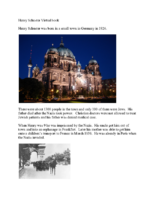
Biographical essay by Henry Schuster, 2014
Date
Archival Collection
Description
This essay describes how Henry Schuster was able to leave Germany through the kindertransport to France in 1939, and arrived in the United States in 1941.
Text
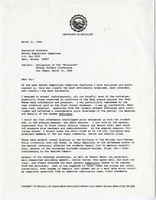
Letter to the Executive Director of the Nevada Humanities Committee from Donald E. Carns evaluating the Holocaust Nevada Student Conference, March 21, 1984
Date
Archival Collection
Description
Letter from Donald E. Carns of the Department of Sociology at UNLV to the Nevada Humanities Committee evaluating the Holocaust Nevada Student Conference held in Las Vegas, March 14, 1984.
Text

